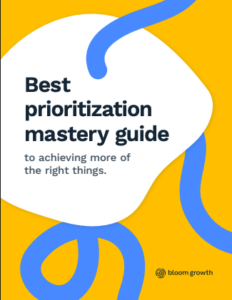This blog is written by Nick Becker, husband, father of seven, Bloom Growth Coach, and long-time mentor. Read his full bio below.
Parenting and entrepreneurship are both full-time roles, and for a long time, I thought I had to find a perfect “balance” between them. But over the years—and with seven kids in the mix—I learned that balance isn’t the goal. Harmony is.
In this post, I want to share my story, what’s worked (and what hasn’t), and how I’ve learned to be intentional in both business and at home.
- Why I chose coaching—for family, not just freedom
- My wake-up call as a parent
- Myths about successful entrepreneurs and families
- Why I stopped chasing “balance” and focused on harmony
- What a typical day may look like
- How I prioritize when everything feels important
- The communication strategies that keep our family connected
- What I’ve learned from failure—in business and parenting
- My go-to habits for any entrepreneur-parent
- Closing thoughts: Lead with humility and keep going
Why I chose coaching—for family, not just freedom
My move into business coaching wasn’t just a career choice—it was a life adjustment, and it was necessary. I needed flexibility to support my immediate and extended family.
Becoming a Bloom Growth Coach gave me the chance to do what I love: helping people grow. I was able to excel professionally while staying available to those who rely on me most—my family.
My wake-up call as a parent
In the early days, I was traveling 80 hours a week while in grad school. I’ll never forget how my son would ignore me when I came home. I had about half a Sunday with him before I had to leave again, and that was heartbreaking. I could see how it was affecting him—how it was influencing our relationship.
Taking the first step
So I started with something small. I bought two copies of a book, one for me, one for him, and we only read them when I was traveling. That created a little ritual just for us. It wasn’t about the book. It was about connection.
Myths about successful entrepreneurs and families
One thing I’ve learned is that people love to make assumptions, especially when it looks like you’ve got your act together. But here’s the truth: most of those assumptions are just myths. Many people are only willing to view your “highlight reel” and assume that everything is picture perfect.
Myth #1: If you’re successful, everything must be perfectly under control.
People see me running my own business, with a big family and kids who seem well-adjusted, and they think, “Wow, he must have it all figured out.”
Reality: There is chaos. There are tough days.
You can be successful, but there will still be missed appointments and emotional moments. The difference is that we work through them together. Success doesn’t mean it’s easy. It just means we’ve learned how to navigate the storm.
Myth #2: You can’t be present for your family and be successful at work.
I’ve had people question whether I really show up for my kids when they see me on my laptop in a parking lot. What they don’t see is that I’m about to spend four hours at a track meet. That 15 minutes of work gave me the freedom to be fully present later.
Reality: You can do both. You just have to be intentional about how and when.
The myths swing to both extremes: either you’re superhuman, or you must be neglecting something. But neither is true. It’s not about perfection. It’s about harmony, communication, and alignment with your priorities.
Why I stopped chasing “balance” and focused on harmony
I don’t manage work and home anymore. Instead, I manage life. When we look at life through the lens of giving a prescribed amount of time and no more, we’re seriously limiting ourselves. Life rarely happens like that.
The idea of “balance” never made sense to me because life isn’t static. Some days, my family needs more of me. Other days, work does. That’s not a failure. It reminds me of music. Like any great piece, sometimes the piano leads, sometimes the drums, but together, they make something beautiful.
What a typical day may look like
When things are working well, here’s what my day looks like (and remember, this is my aspirational day):
- I’m up by 5 AM for some quiet time—prayer, a walk, whatever brings me peace.
- I plan out my day with my Franklin Planner (yes, I’m old school) and prioritize tasks using Personal Kanban (no more than three things at a time).
- I get focused on working for dedicated blocks of time and resist the urge to multitask.
- In the afternoons, I’m often volunteering, attending school events, or helping at church.
- We always eat dinner as a family, and I wrap up work if needed at night.
For me, a good day isn’t about cramming everything in. It’s about being fully present with what’s in front of me.
How I prioritize when everything feels important
My priorities are simple: faith, family, then work. But realistically, urgency can easily throw that out of alignment. A toddler’s meltdown during a client call, a last-minute deadline clashing with dinner—it’s not always clear what should take the front seat.
Example: “You can’t let a toddler’s tantrum derail a critical client call. But you also can’t miss the chance to tell your kid they matter.”
What keeps our family sane is clarity and communication. My wife and kids know what matters most to me, and we’ve talked about it openly. That shared understanding helps us make decisions without resentment or confusion, even when the day goes sideways.
Try the Priority Anchors exercise
- List your top 3 life priorities. Be honest. What truly comes first for you?
- Define what success looks like in each. It’s hard to prioritize what isn’t clearly defined.
- Set boundaries that reflect those values. For example, if “family dinners” reflect your family-first priority, schedule them like a meeting.
- Revisit and adjust weekly. Priorities shift with seasons. Your system should flex, too.
Bonus: Best prioritization mastery guide
 To go deeper, I’ve included a free ebook that walks you through prioritization exercises that can help simplify your schedule. It’s practical, adaptable, and helps you stay focused on what actually matters.
To go deeper, I’ve included a free ebook that walks you through prioritization exercises that can help simplify your schedule. It’s practical, adaptable, and helps you stay focused on what actually matters.
The communication strategies that keep our family connected
We’ve got a family group chat, and it’s become a modern-day support system. When one of us needs help, it’s a reliable way to help each other. That’s our family culture, and it didn’t happen by accident. It was built through consistency and intentional communication.
If you’re trying to build a stronger, more supportive family system, here’s what’s worked for us:
1. Create a shared communication space
Whether it’s a group text, WhatsApp thread, or a family Slack channel, start a space where your family can connect regularly for the big things and little things.
2. Use “turn signals” to manage expectations
When I’ve had a rough day, I tell my kids before I unintentionally bring that energy into the room. I say something like, “Hey, I’m running low today. If I’m short, it’s not about you.” It’s simple, but it sets the emotional tone and prevents misunderstandings.
3. Protect the primary relationship
One of the first things we taught our kids: when Mom and Dad are talking, you wait. That doesn’t make them feel left out. On the contrary, it actually makes them feel secure. Why? Because they see the strength of our relationship, and that gives them peace.
What I’ve learned from failure—in business and parenting
I’ve had project failures. I’ve been laid off. I’ve had moments where I felt like a bad dad. But here’s the thing: Every failure has a lesson. Some lessons take 10 years to show up, but they’re always worth the wait.
When I was younger, I reacted with defensiveness. Now, I respond with reflection. That shift has changed everything.
My go-to habits for any entrepreneur-parent
If you’re just starting out, here’s what I suggest:
1. Be intentional
Don’t let life happen to you. Plan your days with purpose.
2. Signal your emotional state
Tell your kids or team when you’re not at your best. Your honesty to yourself and those around you helps others understand where you’re at.
3. Set realistic expectations
Underpromise. Overperform. Say you’ll get five things done. Do six. That builds trust with others and yourself.
4. Let go of control
Do your best, prepare well, but accept the outcome. Sometimes it’s not up to you.
5. Find a mentor
Aim to find someone a few years ahead of you to offer perspective you don’t have quite yet, someone who’s walked the road you’re about to walk. This is crucial to weathering both parenting and business storms.
Closing thoughts: Lead with humility and keep going
Here’s what I’ve come to believe: Humility is the common thread. You’re going to mess up. So is everyone else. What matters is that you keep showing up.
If you feel overwhelmed, take a deep breath. You’re probably doing better than you think. Entrepreneurship is hard. Parenting is hard. Doing both? That’s heroic. But you don’t have to be perfect, you just have to be present, intentional, and willing to grow.
So keep going.
If this resonated with you, I’d love to hear how you’re building harmony into your own life. Please feel free to reach out. You’re not alone in this beautiful journey of life.

Nick Becker
With nearly 40 years of leadership, consulting, and management experience across the U.S. and internationally, Nick is a seasoned coach and consultant known for building high-performance teams, aligning business strategies, and streamlining operations for sustainable growth.
His cross-industry expertise and experience teaching at multiple academic levels underscore his dedication to team development and measurable business impact.
Grounded in a Midwestern work ethic shaped by early labor-intensive jobs and years of balancing full-time work with academic pursuits, he brings resilience and deep insight into the factors that drive business success. His consulting career has sharpened his ability to diagnose challenges and deliver strategic solutions that produce lasting results.
Outside of his professional work, he is committed to mentorship, coaching his seven children alongside his wife of 34 years. He also leads men’s retreats and support groups focused on fatherhood and life skills. Nick is known for offering empathetic, candid guidance that inspires clarity, unity, and meaningful transformation in both individuals and organizations.

